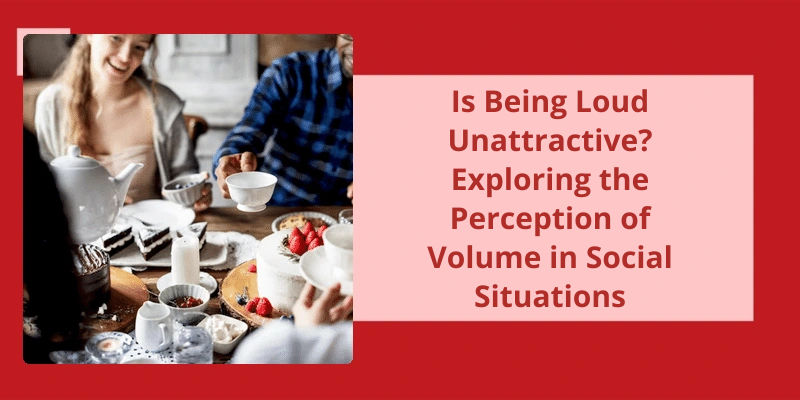The act of being loud has been debated as both an attractive and unattractive quality for individuals. On one hand, loud individuals are often perceived as confident, outgoing, and energetic, which can attract others to them. However, on the other hand, being loud can also come across as annoying, disrespectful, and attention-seeking, which can repel individuals away from them.
What Does It Mean for a Woman to Be Loud?
This term is oppressive and sexist, and it’s often used to silence women who’re speaking up for themselves. Women who don’t conform to societys expectations of being meek and mild are often labeled as loud, when in reality all they’re doing is using their own voice to assert their rights and opinions.
The label of loud woman has deep-rooted patriarchal origins. Women who were seen as assertive or confident were often silenced by society and labeled as difficult to manage. The term loud woman has been used for decades to malign women who don’t fit into the socially accepted mold of femininity.
It’s important to note that being loud doesn’t necessarily mean shouting or yelling. It means having a strong sense of self and standing up for yourself and others when needed. They aren’t afraid to speak the truth, and they’ll call out injustice when they see it.
Understanding the psychology of individuals who tend to be loud can help us better comprehend their behavior and make sense of their actions. It’s important to delve deeper into the underlying insecurities and the need for validation that often drive their loud behavior, rather than simply dismissing it as mere noise. Only then can we take effective steps toward addressing the root causes of this behavior.
What Is the Psychology of Loud People?
Another potential reason for loud behavior is the desire to assert dominance or control over a situation. This could be a result of personal issues, such as a need for power or a lack of control in other areas of their life. Alternatively, it could be a learned behavior from past experiences in which they’d to be loud to get their way or be heard.
In certain situations, such as group settings or public speaking events, loudness can be a strategy to combat social anxiety and nervousness.
Overall, the psychology of loud people is complex and multifaceted, with numerous potential reasons and motivations.
The Ways in Which Loudness Can Lead to Conflicts and Communication Breakdowns in Relationships and the Workplace
When people speak too loudly, it can cause conflicts and communication breakdowns in relationships and the workplace. This is because loudness can be perceived as aggression or disrespect, and may make it difficult for others to hear and comprehend important information. This can lead to misunderstandings, hurt feelings, and a breakdown in trust and cooperation. It’s important to be mindful of one’s volume and tone of voice when communicating with others.
Source: What’s the psychology behind loud people?..
But is loud always synonymous with annoying? While loud sounds can certainly be bothersome, they can also serve practical purposes such as alerting someone to danger or getting a message across in a crowded space. In this article, we’ll explore the nuances of loudness and examine why some people find it more irritating than others.
Does Loud Mean Annoying?
However, loudness is subjective and what’s considered loud by one person may not be considered so by another. For example, a rock concert may be deemed loud and enjoyable by some, while others may find it irritating and uncomfortable. Similarly, a baby crying may be loud and distressing for some, but for the parents it may be a necessary and comforting sound.
Factors such as personal preference, cultural background, and hearing sensitivity can influence ones perception of loudness. For instance, in some cultures, speaking loudly is considered a sign of confidence and assertiveness, whereas in others it may be seen as rude or aggressive. Moreover, people with hearing impairments may have a different threshold for loudness than those with normal hearing, and may perceive sounds as louder than they actually are.
It’s also important to note that loudness can have effects beyond annoyance. Exposure to loud noises for extended periods of time can lead to hearing damage and loss. Additionally, loud noises can disrupt sleep patterns, increase stress levels, and even cause anxiety and other health problems.
While loud sounds may be considered annoying by some, it’s a subjective matter and depends on personal factors such as culture, hearing sensitivity, and preference. It’s important to be mindful of the effects of loudness and to take steps to protect ones hearing and well-being when exposed to loud noises.
The Connection Between Loudness and Emotional Responses: How Does Loudness Affect Our Mood, and Why Do Some People Find Certain Loud Sounds Cathartic or Even Therapeutic?
- Increased loudness can trigger a fight or flight response in the body, leading to feelings of anxiety or stress.
- Excessive loudness can also cause hearing damage and potentially lead to hearing loss.
- On the other hand, certain loud sounds such as thunder or even heavy metal music can be cathartic for some individuals.
- Loudness can also be used therapeutically, such as in sound therapy or music therapy for individuals with certain neurological conditions.
- Overall, the connection between loudness and emotional responses is complex and varies from person to person.
Understanding why someone is always loud can help you communicate with them more effectively and improve your relationship with them. It’s important to approach the situation with empathy and an open mind, rather than judgment or annoyance. In this article, we’ll explore some common reasons for loud speaking and provide tips on how to handle it in different scenarios.
What Does It Mean When Someone Is Always Loud?
For some people, their loudness may be a result of their personality or cultural background. However, it’s important to recognize that everyone has their own communication style and what may be perceived as loudness by one person may not be perceived the same way by another.
It can be difficult to have a conversation with someone who’s always talking loudly, as it can be overwhelming and distracting. Loudness can also be perceived as aggression or hostility, even if that isn’t the person’s intention.
On the other hand, there are some situations where being loud is necessary or even beneficial. For example, in a crowded environment with a lot of noise, speaking loudly may be necessary to be heard. In a public speaking context, being loud and confident in one’s delivery can be effective in engaging an audience.
It can be a result of personality, upbringing, cultural background, or environmental factors. Ultimately, effective communication involves finding a way to navigate and accommodate for different styles and tendencies.
How to Address Loudness in a Constructive and Respectful Manner
- Speak calmly and clearly
- Avoid using accusatory language
- Focus on your feelings and observations rather than making assumptions
- Suggest possible solutions or compromises
- Show empathy and understanding towards the other person’s perspective
- Reiterate your desire for a peaceful and respectful interaction
Taking care of our hearing is crucial, especially if we notice specific changes in our ability to hear. Speaking too loudly is a common symptom that could indicate underlying hearing loss. It’s essential to be aware of other warning signs and seek medical attention if necessary. In the next section, we’ll discuss some common causes of hearing loss and ways to prevent it from getting worse.
What Happens if You Speak Too Loudly?
Speaking too loudly can also have negative effects on your vocal health. Constantly straining your voice can cause hoarseness, vocal fatigue, and even vocal cord damage. This is especially true for individuals who rely on their voice for their profession, such as singers, actors, and public speakers. To prevent these issues, it’s important to practice proper vocal hygiene and warm up your voice before prolonged use.
In social situations, speaking too loudly can be seen as rude or obnoxious. It can also detract from effective communication as the listener may become overwhelmed by the sheer volume of your voice. Tone and volume are important factors in conveying meaning and emotion, and using a consistent volume that’s appropriate for the situation is key.
It may come across as aggressive and cause others to shut down or become defensive. On the other hand, speaking calmly and at an appropriate volume can lead to better communication, understanding, and collaboration.
These individuals may benefit from therapy or counseling to address the root cause of their behavior and learn healthy communication skills.
It’s important to seek medical attention if hearing loss is suspected, practice proper vocal hygiene, and be mindful of appropriate volume in social situations. Effective communication requires both speaking and listening, and finding a balance in tone and volume can lead to better understanding and stronger relationships.
Tips for Preventing Vocal Strain and Damage
Voice strain and damage can be prevented by practicing good vocal hygiene habits such as staying hydrated, avoiding smoking and caffeine, warming up before speaking, and taking regular breaks. Also, using voice amplifiers and speaking at a comfortable volume can help reduce strain. It’s important to listen to your body and seek medical attention if any vocal issues persist.
Conclusion
While it may be a turn-off for some individuals, it’s important to recognize that every person has their own unique qualities and personality traits that contribute to their attractiveness. Labeling individuals as unattractive simply because of their volume levels perpetuates harmful stereotypes and discrimination. Ultimately, it’s important to appreciate and celebrate diversity in all it’s forms, and refrain from making snap judgments based on superficial characteristics. Let’s strive to create a society that values all individuals, regardless of their volume levels.






